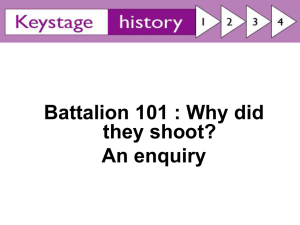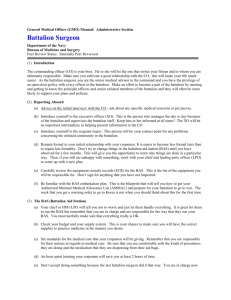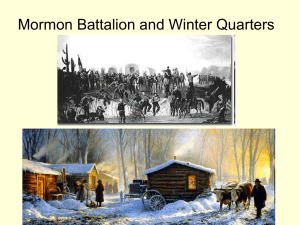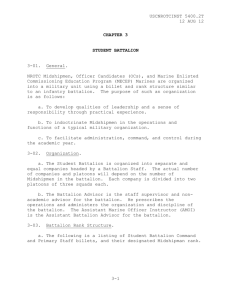An Effective Battalion Chief - Code 3 Fire Training & Education
advertisement
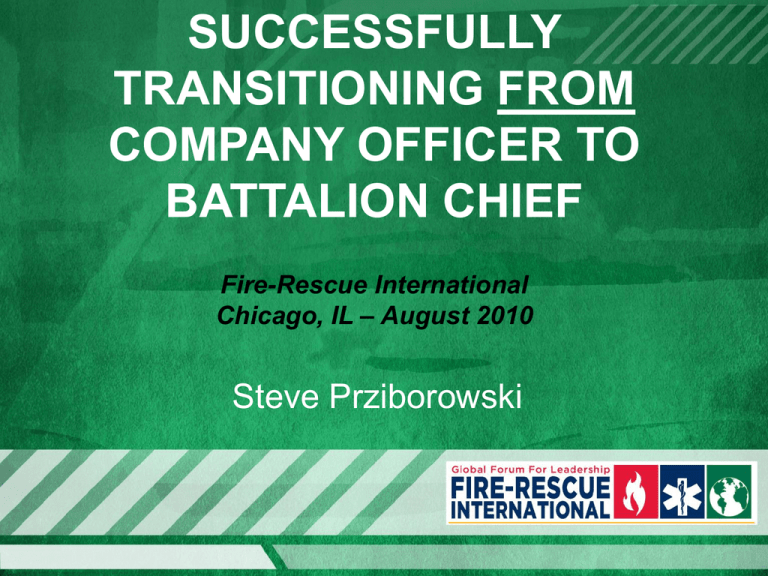
SUCCESSFULLY TRANSITIONING FROM COMPANY OFFICER TO BATTALION CHIEF Fire-Rescue International Chicago, IL – August 2010 Steve Prziborowski Objectives: • Identify traits of an effective Battalion Chief • Determine how you will present yourself once promoted to Battalion Chief • Create personnel expectations for your Company Officers and their crews • Develop an action plan to successfully transition from Company Officer to Battalion Chief Congratulations on wanting to become a Battalion Chief! • I hope you’re aware that this is probably one of the most drastic leaps in rank within the fire service…… • Instead of going from “Buddy to Boss,” you’re going from “Boss to the Dark Side!” • There are also some differences from when you were a company officer ……… As a Battalion Chief, You’re in a different vehicle As a Battalion Chief, You’re using different tools Regardless of the differences, as a Battalion Chief, you have the obligation to be the best you can be……………… Why? Because our personnel, our department, the people we serve and our community deserves and expects us to be! Think about this……… • Of all the Battalion Chiefs you have ever worked under……………………….. - Are there more good ones than bad ones? - Were any of them perfect? - Can you take something (good or not-sogood) from each of them to use when you are a Battalion Chief? What are some traits of an effective Battalion Chief? An Effective Battalion Chief: • Has life experience • Has fire service experience • Is educated & trained in the fire service • Is a leader • Is a good listener • Is a great oral communicator • Is a good time manager • Is a mentor • Is ethical An Effective Battalion Chief: • Has command presence • Is organized • Is credible • Has planning skills • Has compassion • Has ability & desire to build & maintain effective working relationships • Is politically aware • Is politically sensitive An Effective Battalion Chief: • Likes people • Understands customer service • Does not forget where they came from • Can make a decision • Is respected • Holds their personnel accountable • Holds themselves accountable • Practices succession planning An Effective Battalion Chief: • Sees the big picture • Is dependable • Is passionate about the fire service • Can be firm, fair, & impartial • Understands progressive discipline • Praises in public, disciplines in private An Effective Battalion Chief: • Is progressive • Understands & respects tradition, but isn’t tied to it • Takes care of their personnel • Has the ability to modify the status quo as needed • Can say “I am wrong” or “I made a mistake” • Is responsible • Understands they are the designated adult An Effective Battalion Chief: • Realizes they support their suppression personnel as well as their administration personnel • Is flexible • Makes safety a top priority • Doesn’t let their ego get in the way • Realizes they cannot please everybody, but want to do the greatest good for the greatest number An Effective Battalion Chief: • Doesn’t accept mediocrity • Is able to balance quality time with personnel & administrative duties • Is passionate about their personnel, their department, & their community • Talks the talk & walks the walk An Effective Battalion Chief: • Does not micromanage • Supports their personnel • Keeps their supervisor in the loop as appropriate • Understands the fire service is a full-service organization • Is accessible to their personnel How do you rate? • Know anyone that meets all of those standards? • Doesn’t mean you can’t strive to meet those standards! • Anything else??????? Developing Your Action Plan To Successfully Transition From Company Officer To Battalion Chief How you plan to present yourself: • Hopefully this is done well in advance of your promotion to Battalion Chief • Write out a list of all of the things you have liked and disliked about other chief officers you have worked for or have heard or read about. • Promise yourself to never do the negative things others have done How you plan to present yourself: • Talk to chiefs currently in the position, asking them their opinions on how you can successfully transition from Company Officer to Battalion Chief • Hopefully they can share their successes and failures • Don’t just limit yourself to your own department (create a network) How to build credibility & respect: • Put together a to-do list, and use it as a check-list to evaluate your performance on a regular basis • Include education, training, experience, as well as knowledge, skills, and abilities you would like to obtain Personnel Expectations: • As a Company Officer, you should have already established personnel expectations. • If you have not, it’s never too late to start. • As a Battalion Chief, failing to have personnel expectations is a recipe for failure! Personnel Expectations: • Write them out in advance, ensure they are reasonable, obtainable, legal, ethical, and appropriate for your situation • Share them with your Company Officers to share with their crews • Encourage your Company Officers to share their expectations with their personnel • Hold your Company Officers accountable! Once You’re A Battalion Chief… • Enjoy the journey, it will go fast. • Realize the higher up the chain of command you rise, the less people will “like you.” • Don’t try to be “liked” or “everyone’s best friend.” Instead, try to be “respected” by your peers and/or superiors. Once You’re A Battalion Chief… • Don’t forget: it’s the position or rank they dislike. • Realize, you’re more in the spotlight now than you ever were. Once You’re A Battalion Chief… • One wrong word out of your mouth can doom your career or reputation. • One wrong word documented can also doom your career or reputation. Once You’re A Battalion Chief… • You’re no longer “one of the guys or gals” (hopefully you realized that when you got promoted to Company Officer). • You’re now “one of them” (administration). Get used to it. Once You’re A Battalion Chief… • If there was ever a time to be calm, cool and collect, at everything you do – now is it! • I hope you realize the liability, the commitment, and the responsibility you have to your personnel, your community and your department. Your job is to NOT let this happen on your watch: Ensuring this doesn’t happen: • Do your job…….and do it well! • Share lessons learned and other training or safety bulletins/news items with your personnel: – www.firefighterclosecalls.com – www.emsclosecalls.com – www.firefighternearmiss.com – www.everyonegoeshome.com Ensuring this doesn’t happen: • • • • Don’t allow or settle for mediocrity Continuously raise the bar Make every moment a training opportunity Train like your life or someone else’s life depends on it – it does!! • Ensure that safety is not limited to lip service Ensuring this doesn’t happen: • Treat training like the real thing (practice like you play) • Correct unsafe behaviors immediately • Learn from past firefighter fatalities, injuries, and/or near-misses • If we fail to learn from history, we are doomed to allowing history to repeat itself! When Making Decisions: • Use the Headline Test: 1.Is it the right thing for our personnel? 2.Is it the right thing for our department? 3.Is it the right thing for our community? 4.Would you mind reading about it in the morning newspaper? If you can answer a positive yes to all 4: GO FOR IT! Closing Thoughts: • A Battalion Chief can truly feel stuck in the middle – between line and staff, because you have two primarily loyalties. • You have to be loyal to your subordinates and your superiors, not to mention your peers Closing Thoughts: • It’s not “us versus them” anymore • It’s “all of us are in this together” to do what is best for the personnel, the public, and the communities we serve • Make sure you keep your supervisor in the loop, and know what they expect of you Closing Thoughts: • You may not agree with the decisions made above your head; however, once a decision has been made, accept it like it was your own decision. • Very few of your decisions require immediate action Closing Thoughts: • Don’t be part of the problem, be part of the solution • Don’t allow your personnel to come to you with problems, without having thought of at least 2 solutions Closing Thoughts: • When making a decision, ask yourself – can I justify it to the public, the department, the union, and to my family? • One wrong decision or choice of words can doom your career and level of respect Questions? • Thank you very much for your time! CONTACT INFORMATION: • Steve Prziborowski • 408-205-9006 – sprziborowski@aol.com – www.code3firetraining.com – www.chabotfire.com

